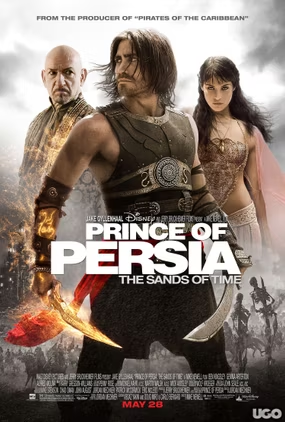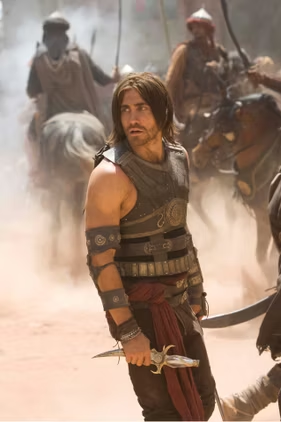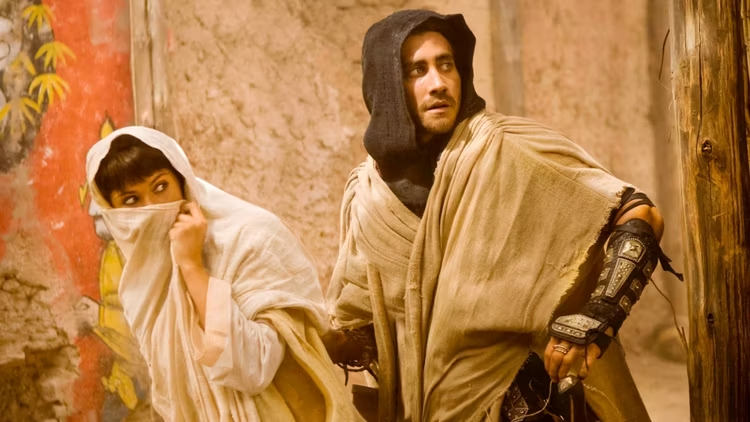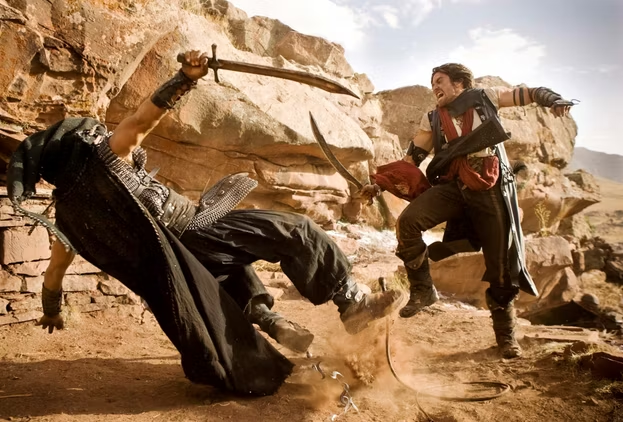
The Prince of Persia: The Sands of Time
If you’re looking for an adventurous action-packed movie sprinkled with a little bit of romance, The Prince of Persia: The Sands of Time is your film. It’s got an element of mystery and magic to it that you’ll enjoy.
While it’s a great movie, you could find some critiques (such as the decision to cast white actors to play Middle Eastern characters). However, let’s focus on something the film does really well, intentionally or not: it shows what real humility looks like.
Of course, if you are anything like me, your first motive in watching a movie is to be entertained. The great thing about The Prince of Persia is that it’s fun and inspirational. Warning: spoilers ahead!

The Movie’s Plot
Dastan is a dashing and courageous Persian prince. He was an orphan living in the streets until the powerful Persian ruler, King Sharaman, saw Dastan defend another boy against cruel guards. Sharaman saw greatness in Dastan, and adopted him into his family.
Years later, Dastan and his two older brothers, Garsiv and Tus, along with their uncle, Nizam, are leading battles for the empire. They encounter the holy city of Alamut, which they were not commanded by Sharaman to attack. However, they hear rumors that Alamut is supplying weapons to Persia’s enemies, so Tus orders them to invade the city.
During the intense invasion, Dastan comes across a curious dagger, and his troops seal the victory over the city. Princess Tamina of Alamut is not pleased that the Persians have overtaken her city, but her interest is piqued when she sees Dastan with the dagger.
After Sharaman comes to Alamut, chastening his sons for attacking a peaceful city, someone poisons him with a cloak and he dies at the celebratory feast. Dastan gave Sharaman the cloak, so he gets blamed for his father’s death. Tamina helps him escape the city, and they ride off into the desert together.

As Dastan tries to figure out his next move, he soon discovers that the dagger is no ordinary dagger. When filled with sand, it allows one to go back in time and change the past few minutes.
Dastan thinks Tus attacked Alamut to procure the dagger, but later realizes that Nizam is the power-hungry one. Both of Dastan’s brothers get killed as they suspect Dastan and don’t see Nizam coming.
Meanwhile, Tamina is the current guardian of the dagger and wants to seal it back into the stone it came from to protect everyone. Dastan agrees to help her, and wants to stop Nizam from taking the dagger as well. He suspects that Nizam wants to pierce the sands of time and go back to his childhood when he saved his brother from a beast, so that he can have a lifetime as king.
As Tamina and Dastan work together, their initial rivalry turns into love, and they passionately kiss before Tamina, too, dies trying to save the world from Nizam’s greed.
Finally, Dastan and Nizam battle it out, holding onto the dagger ripping open the sandglass, and Dastan is victorious. He goes back in time to the initial attack on Alamut, stops the invasion, unmasks Nizam as a traitor, and protects everyone he loves from a devasting fate.

Why Dastan is an Awesome Example of Humility
Basically, Dastan is the hero and saves the world, but because he went back in time, no one knows what he’s done! He lived an epic adventure that only he remembers now, that no longer happened. Tamina doesn’t remember him and hasn’t fallen in love with him yet.
However, we do see a knowing look in her eyes as Dastan presents her the dagger, as if she suspects something. But only Dastan knows the extent of his heroics.
Watching this movie for the first time (and for the tenth or twentieth time), I was concerned that Dastan didn’t receive his glory for saving the day. I was distressed that no one knew of Dastan’s greatness and what he had accomplished, that his heroics were wiped away by the sands of time.
But I think I got it all wrong. Dastan’s lack of concern that no one remembered his victory, his perseverance to save the people he loved, no matter the costs, and his satisfaction with how things turned out, are all signs of his humility. He didn’t mourn the fact that Tamina didn’t remember their love story, or that the world would never know what he did to save it. Dastan was simply overjoyed that his father, brothers, and Tamina were alive and safe.
Another sign of Dastan’s humility is when he confronts Nizam and says, “You had what every man could ever dream of. Love, respect, and family. But that wasn’t enough for you, was it?”1 Dastan’s heart, throughout the film, is in the right place. He valued morals, home, and family more than being a prince or having power.

Humility vs. Pride
Dastan is a great example of humility. Merriam-Webster defines humility as “freedom from pride or arrogance.”2 The Church of Jesus Christ of Latter-day Saints teaches that humility is about acknowledging your need for God and His support.3
Its opposite is pride, which a church leader, President Benson, taught is pitting yourself against other people and/or against God, thinking you are better than others, and being jealous of others. It also involves caring more about the praise of the world than the praise of God.4
Clearly, Nizam is a perfect example of pride. He wanted the glory and riches of the world more than anything else. He was willing to kill to achieve power. In contrast, Dastan, coming from the streets, was more grateful to have a home and a family than a prestigious position as a prince of Persia. He loved his family and stayed true to his values and character.
A Book of Mormon Comparison
Nizam and Dastan could be compared to the Nephites and the Nephite dissenters in the Book of Mormon (a book of scripture about people in the Americas that testifies of the Savior). Captain Moroni, the leader of the Nephite armies, was “a man who did not delight in bloodshed” but fought for family, faith, and freedom (Alma 48:11).
While Dastan perhaps enjoys a good fight more than Moroni, he does fight for similar righteous motives. However, Nizam is like the Nephite dissenters, who encouraged another group of people, the Lamanites, to go to battle against the Nephites, seeking blood and power.

What’s Truly Heroic
Whenever I watch The Prince of Persia: The Sands of Time, I’m deeply distressed that Dastan doesn’t get the glory he deserves. But it’s enough for him that he saved his family and stopped the destruction of the empire from the sands of time. He didn’t need worldly recognition.
Next time I watch The Prince of Persia, I want to remember what’s truly heroic: Dastan’s humility. Imagine saving the world and no one remembering what you did!
I certainly lack Dastan’s humility, but there’s a lot of power in resisting the desire for power and popularity, and instead doing what’s right and sticking to your values. The ultimate example of humility is our Savior, and He is willing to help us along our own journeys of adventure, trial, and opportunity.
What do you think? Comment below if you agree that Dastan is a great example of humility. What other examples in pop culture are beacons of Christian humility?

Discussion and Reflection Questions
- What does humility mean to you?
- Would you say Dastan is humble? Why or why not?
- Can you be humble and confident?
- What’s the difference between prideful arrogance and humble confidence?
- What does the Savior’s example teach us about humility?
This article is a part of the “Christianity and Pop Culture Series,” where Christian values are explored through the lens of modern movies, books, TV shows, etc. Enjoy!
Sources
- https://www.imdb.com/title/tt0473075/quotes/?item=qt1196183 ↩︎
- https://www.merriam-webster.com/dictionary/humility#:~:text=%3A%20freedom%20from%20pride%20or%20arrogance,The%20ordeal%20taught%20her%20humility. ↩︎
- https://www.churchofjesuschrist.org/study/manual/gospel-topics/humility?lang=eng#title1 ↩︎
- https://www.churchofjesuschrist.org/study/general-conference/1989/04/beware-of-pride?lang=eng ↩︎



1 Comment
Bre · February 27, 2025 at 3:38 pm
I love how the author of this article brought the spiritual into something as everyday as a pop culture reference! It helps me so much to do this, because it helps me to realize how much God really can be found in seemingly normal (unspiritual) things in life. I also really love that this article is about humility specifically. It’s something I find myself continuously working on as I try to become more like Christ.
Comments are closed.